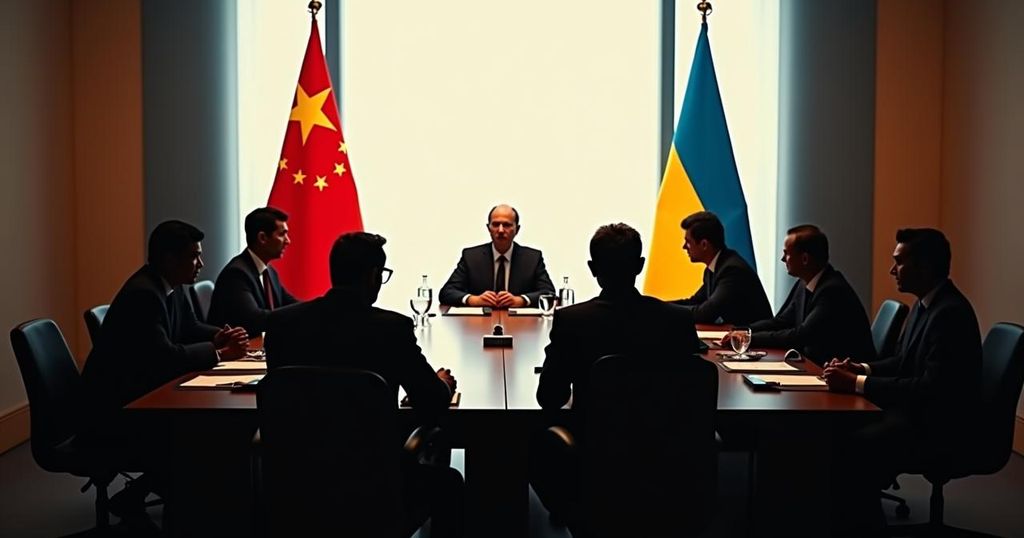China and Brazil’s Peace Initiative at United Nations Faces Ukrainian Opposition
China and Brazil are advocating for a peace plan to end the war in Ukraine, despite opposition from Ukrainian President Volodymyr Zelenskyy. Seventeen countries participated in discussions that emphasized preventing escalation and protecting critical infrastructure. U.S. Secretary of State Antony Blinken highlighted concerns regarding China’s support for Russia. Meanwhile, Zelenskyy met with former President Trump amid apprehensions about future U.S. aid. Humanitarian impacts continue to worsen, with reports of civilian casualties and deportation of children, calling for immediate international resolution efforts.
China and Brazil continue to advocate for a peace plan addressing the ongoing conflict in Ukraine, representing the interests of developing nations at the United Nations. This initiative occurs amid Ukrainian President Volodymyr Zelenskyy’s vocal opposition, as he believes the proposal primarily serves Moscow’s interests. During a meeting chaired by Chinese Foreign Minister Wang Yi and Brazilian foreign policy adviser Celso Amorim, representatives from seventeen countries deliberated on measures to prevent escalation of the war, the threat of weapons of mass destruction, and safeguarding nuclear facilities from attack. In response to the discussions proposed by China and Brazil, President Zelenskyy expressed his concerns, questioning the necessity of alternative peace proposals to his own framework. He articulated that such initiatives could potentially provide Russia with the political leeway to prolong their military operations in Ukraine. U.S. Secretary of State Antony Blinken echoed Zelenskyy’s sentiments, stressing the contradictory nature of China’s actions. He pointed out that while China professes the desire for an end to hostilities, it simultaneously allows its companies to contribute to Russia’s military capabilities, highlighting a lack of coherency in Chinese foreign policy. Moreover, during the UN assembly, the foreign minister of South Korea reported that Russia has been engaged in illicit arms trading with North Korea, indicating a troubling exchange of military materials contrary to global regulations. In separate diplomatic engagements, former U.S. President Donald Trump met with President Zelenskyy in New York in an attempt to navigate their increasingly strained relationship amid concerns over future U.S. military aid to Ukraine. Following their meeting, Zelenskyy characterized their discussions as “very productive” and reiterated the importance of preventing a victory for President Putin. Additionally, Finland announced the establishment of a NATO base near its border with Russia, underlining its commitment to collective security after changing its historical stance on military alignment due to the ongoing conflict. In ongoing military developments, Russian forces reported capturing the village of Marynivka in eastern Ukraine amidst intense resistance from Ukrainian troops. Meanwhile, the situation also included troubling allegations of the Russia-Ukraine conflict resulting in the unlawful deportation of children, with a recent repatriation operation facilitated by Qatar. On the humanitarian front, civilian suffering continued as evidenced by a Russian missile attack that tragically resulted in civilian casualties in the city of Kryvyi Rih, underscoring the ongoing impact of the war on Ukraine’s population. These developments indicate a complex web of diplomatic negotiations, military engagements, and the human cost of the conflict, demanding a concerted international effort to facilitate a lasting resolution to the crisis in Ukraine.
The conflict in Ukraine, initiated by Russia’s invasion in February 2022, has sparked a series of geopolitical consequences and diplomatic negotiations involving various nations. The war has prompted a reevaluation of military alliances, as demonstrated by Finland’s recent accession to NATO. In the global arena, two major players, China and Brazil, have sought to consolidate support for their peace proposal among developing countries, which has been met with skepticism from Ukraine. President Zelenskyy asserts that alternative peace plans undermine Ukraine’s position and empower Russia’s continued military aggression. The U.S. remains actively involved in monitoring and responding to these developments, particularly regarding China’s relations with Russia and the implications for global security. The situation remains complex as various nations navigate their diplomatic stances while the humanitarian crisis continues to escalate.
In summary, the ongoing war in Ukraine has prompted a multitude of diplomatic efforts aimed at seeking resolution, exemplified by the proposed peace initiative by China and Brazil. President Zelenskyy’s opposition highlights the concerns of Ukraine regarding any proposals perceived to favor Russian interests. With the U.S. expressing its discontent with China’s role and South Korea revealing illegal arms transactions between Russia and North Korea, the international community must remain vigilant. The humanitarian aspect of the conflict, marked by civilian casualties and the issue of deported children, underscores the urgent need for a comprehensive and effective resolution to the war.
Original Source: www.theguardian.com




Post Comment